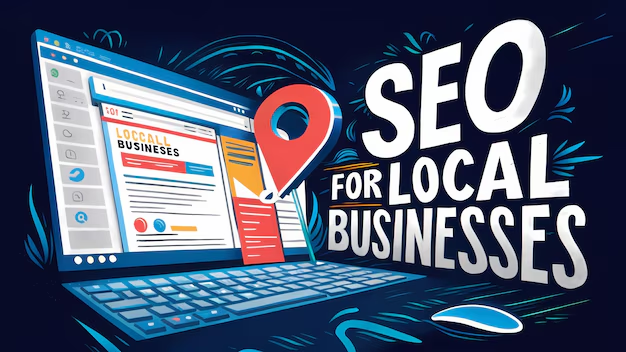Introduction:
Why Local SEO is a Goldmine for Affiliate Marketers

In 2024, local SEO is no longer just for brick-and-mortar businesses. Affiliate marketers are tapping into geo-targeted niches to rank for high-intent searches like “best running shoes for Austin” or “organic grocery stores in the Pacific Northwest.” By combining localized content with affiliate offers, savvy marketers are earning commissions while solving hyper-specific problems for their audiences.
This guide breaks down actionable local affiliate marketing strategies, from keyword research to content creation, helping you dominate geo-specific niches and outrank competitors.
(Keywords: “local affiliate marketing strategies,” “geo-specific affiliate content”)
Phase 1: Identifying Profitable Geo-Targeted Niches
Not all local keywords are created equal. Follow this framework to find low-competition, high-reward opportunities:
1. Use Localized Keyword Research Tools
- Google Keyword Planner: Filter keywords by location (e.g., “Portland”) and look for phrases like:
- “best [product] in [city]”
- “affordable [service] near me”
- Ahrefs: Analyze “geo-modified” keywords with low Difficulty Scores (DS < 20).
- Example: “vegan meal delivery Seattle” (200 searches/month, DS 15).
2. Validate Demand with Google Trends
Compare regional interest spikes. For instance:
- “snow boots in Denver” peaks every November.
- “hiking gear in Colorado” trends year-round.
3. Spy on Local Competitors
Tools like SEMrush reveal which affiliates are ranking for terms like “yoga studios in Miami”. Reverse-engineer their content and backlinks.
(Keywords: “geo-targeted keyword research,” “local affiliate niches”)
Phase 2: Crafting Geo-Specific Affiliate Content That Converts

Local audiences crave relevance. Structure your content to answer their unique needs:
1. Optimize for “Near Me” Searches
- Title Tags: “Best Running Shoes in Chicago (2024) – Top Picks by Local Experts”
- Meta Descriptions: Include city names and CTAs like “Shop local deals today.”
2. Hyper-Localized Blog Post Ideas
- Roundups: “7 Organic Grocery Stores in Austin Approved by Nutritionists”
- Seasonal Guides: “Winter Hiking Gear for Vermont’s Toughest Trails”
- Event-Based Content: “Where to Buy Marathon Gear Before the NYC Race”
3. Embed Local Signals
- Mention landmarks, neighborhoods, or cultural references (e.g., “Pike Place Market-approved reusable bags”).
- Add embedded Google Maps showing store locations.
- Interview local influencers or customers for authentic testimonials.
(Keywords: “geo-specific content creation,” “localized affiliate offers”)
Phase 3: On-Page SEO for Local Dominance

Technical optimization ensures search engines recognize your content’s geographic focus.
1. Schema Markup for Local SEO
Implement Local Business schema on your site to highlight:
- Service areas (e.g., “Serves Los Angeles County”).
- Affiliate partnerships with local brands.
2. Optimize for Mobile & Voice Search
- 60% of “near me” searches come from mobile. Ensure fast load times (<2 seconds) and mobile-friendly design.
- Target voice search phrases like “Where can I buy organic coffee beans near me?”
3. NAP Consistency
Even as an affiliate, list a local address (virtual office or co-working space) and phone number (Google Voice) on your Contact page.
(Keywords: “local SEO for affiliates,” “geo-targeted on-page SEO”)
Phase 4: Building Local Backlinks & Partnerships

Earning links from locally trusted sites boosts rankings and credibility.
1. Partner with Local Businesses
- Offer to write guest posts for local blogs (e.g., “5 Best Bike Shops in Portland” for a cycling blog).
- Negotiate affiliate deals with brick-and-mortar stores (e.g., 10% commission for in-store referrals).
2. Leverage Local Directories
- Submit your site to Google Business Profile, Yelp, and niche directories like Local Harvest (for organic products).
- Ensure your business name, address, and phone number (NAP) match everywhere.
3. Sponsor Local Events
- Sponsor a 5K race and create content like “Where to Buy Running Gear for the Boston Marathon”.
- Get featured on event websites for backlinks.
(Keywords: “local backlink strategies,” “geo-specific affiliate partnerships”)
Phase 5: Promoting Your Content Locally

Drive traffic to your affiliate content with geo-targeted campaigns.
1. Google Ads with Location Extensions
Run PPC campaigns targeting keywords like “best gyms in Dallas” and add location extensions to display your address.
2. Social Media Hyper-Targeting
- Facebook Ads: Narrow audiences by city + interests (e.g., “yoga enthusiasts in San Diego”).
- Instagram Stories: Tag local businesses in your affiliate product demos.
3. Local Email Marketing
Build a subscriber list with lead magnets like:
- “Austin’s Top 10 Fitness Trails (Free PDF Guide)”
- Send newsletters featuring limited-time local deals (e.g., “20% Off at Portland Running Company – Today Only!”).
(Keywords: “geo-targeted traffic sources,” “local social media marketing”)
Case Study: How ‘Outdoor Gear Hub’ Earned $5k/Month Targeting Colorado
- Niche: Hiking and camping gear for Rocky Mountain states.
- Strategy:
- Published guides like “Best Winter Tents for Colorado Camping.”
- Partnered with local outfitters for exclusive discounts.
- Ran YouTube videos testing gear in Rocky Mountain National Park.
- Results: 12k monthly visitors, 8% affiliate conversion rate.
5 Tools to Automate Local SEO for Affiliates
- Bright Local: Track local rankings and reviews.
- Moz Local: Fix NAP inconsistencies.
- Canva: Design location-specific social media graphics.
- Answer The Public: Find geo-modified questions (e.g., “Where to buy kayaks in Michigan?”).
- Hunter.io: Find email addresses for local partnership pitches.
FAQ: Local Affiliate Marketing in 2024
Q: Can I rank locally without a physical address?
A: Yes, but a virtual office or P.O. box adds credibility.
Q: How long does local SEO take to work?
A: 3–6 months with consistent content and backlinks.
Q: Best affiliate programs for local niches?
A: ShareASale (local services), Amazon Local (deals by city), and niche networks like Avant Link (outdoor gear).
Conclusion: Start Dominating Your Geo-Targeted Niche
Local SEO gives affiliate marketers a unique edge in 2024. By creating hyper-relevant content, optimizing for “near me” searches, and partnering with local businesses, you can turn regional intent into recurring revenue.
Ready to go local? Pick your city, publish your first geo-specific guide, and watch your affiliate commissions grow!

![Introduction: Why Local SEO is a Goldmine for Affiliate Marketers In 2024, local SEO is no longer just for brick-and-mortar businesses. Affiliate marketers are tapping into geo-targeted niches to rank for high-intent searches like “best running shoes for Austin” or “organic grocery stores in the Pacific Northwest.” By combining localized content with affiliate offers, savvy marketers are earning commissions while solving hyper-specific problems for their audiences. This guide breaks down actionable local affiliate marketing strategies, from keyword research to content creation, helping you dominate geo-specific niches and outrank competitors. (Keywords: "local affiliate marketing strategies," "geo-specific affiliate content") Phase 1: Identifying Profitable Geo-Targeted Niches Not all local keywords are created equal. Follow this framework to find low-competition, high-reward opportunities: 1. Use Localized Keyword Research Tools Google Keyword Planner: Filter keywords by location (e.g., “Portland”) and look for phrases like: “best [product] in [city]” “affordable [service] near me” Ahrefs: Analyze “geo-modified” keywords with low Difficulty Scores (DS < 20). Example: “vegan meal delivery Seattle” (200 searches/month, DS 15). 2. Validate Demand with Google Trends Compare regional interest spikes. For instance: “snow boots in Denver” peaks every November. “hiking gear in Colorado” trends year-round. 3. Spy on Local Competitors Tools like SEMrush reveal which affiliates are ranking for terms like “yoga studios in Miami”. Reverse-engineer their content and backlinks. (Keywords: "geo-targeted keyword research," "local affiliate niches") Phase 2: Crafting Geo-Specific Affiliate Content That Converts Local audiences crave relevance. Structure your content to answer their unique needs: 1. Optimize for “Near Me” Searches Title Tags: “Best Running Shoes in Chicago (2024) – Top Picks by Local Experts” Meta Descriptions: Include city names and CTAs like “Shop local deals today.” 2. Hyper-Localized Blog Post Ideas Roundups: “7 Organic Grocery Stores in Austin Approved by Nutritionists” Seasonal Guides: “Winter Hiking Gear for Vermont’s Toughest Trails” Event-Based Content: “Where to Buy Marathon Gear Before the NYC Race” 3. Embed Local Signals Mention landmarks, neighborhoods, or cultural references (e.g., “Pike Place Market-approved reusable bags”). Add embedded Google Maps showing store locations. Interview local influencers or customers for authentic testimonials. (Keywords: "geo-specific content creation," "localized affiliate offers") Phase 3: On-Page SEO for Local Dominance Technical optimization ensures search engines recognize your content’s geographic focus. 1. Schema Markup for Local SEO Implement LocalBusiness schema on your site to highlight: Service areas (e.g., “Serves Los Angeles County”). Affiliate partnerships with local brands. 2. Optimize for Mobile & Voice Search 60% of “near me” searches come from mobile. Ensure fast load times (](https://annzify.com/wp-content/uploads/2025/03/young-businesswoman-with-seo-sign_488220-49878.avif)